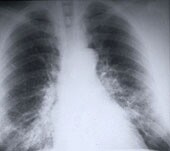
WEDNESDAY, May 26 (HealthDay News) — A drug derived from shark cartilage failed to improve survival in patients with advanced lung cancer, researchers report.
The disappointing results, which came in the final stage of testing, showed that the drug didn’t help extend the life spans of patients with inoperable stage III non-small cell lung cancer.
Scientists have been testing drugs derived from shark cartilage because it appears to prevent blood vessels from growing around tumors. The hope is that the drugs will prevent cancer cells from being fed by blood, which allows them to grow.
Researchers led by Dr. Charles Lu, of the University of Texas M.D. Anderson Cancer Center, tested the specific drug in question, known as AE-941, on patients in the United States and Canada.
In the study, published online May 26 in the Journal of the National Cancer Institute, a total of 379 patients with inoperable non-small cell lung cancer were treated with chemoradiotherapy and either AE-941 or an inactive placebo.
There was no significant difference in outcome between the two groups in terms of overall survival, or in length of time before the disease progressed, the researchers found.
The study authors noted that the study’s impetus was “the widespread use of poorly regulated complementary and alternative medicine products, such as shark cartilage-derived agents, among patients with advanced cancer, a population likely to be vulnerable to unsubstantiated marketing claims.”
More information
For more on lung cancer, try the U.S. National Library of Medicine.

